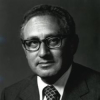Henry A. Kissinger

Henry A. Kissinger
Henry Alfred Kissingeris an American diplomat and political scientist. He served as National Security Advisor and later concurrently as United States Secretary of State in the administrations of presidents Richard Nixon and Gerald Ford. For his actions negotiating the ceasefire in Vietnam, Kissinger received the 1973 Nobel Peace Prize under controversial circumstances, with two members of the committee resigning in protest. Kissinger later sought, unsuccessfully, to return the prize. After his term, his advice has been sought by world leaders...
NationalityGerman
ProfessionStatesman
Date of Birth27 May 1923
CountryGermany
Far too often, the Ukrainian issue is posed as a showdown: whether Ukraine joins the East or the West. But if Ukraine is to survive and thrive, it must not be either side's outpost against the other - it should function as a bridge between them.
One theory is that we will make war look so attractive that we undermine the deterrent. That's Never Never Land. What we have now would have been enough to deter Hitler. But we are talking in a different order of reality.
The real distinction is between those who adapt their purposes to reality and those who seek to mold reality in the light of their purposes.
While we should never give up our principles, we must also realize that we cannot maintain our principles unless we survive.
To revolutionaries the significant reality is the world which they are fighting to bring about, not the world they are fighting to overcome.
There is no realism without an element of idealism.
The idea of abstract power only exists for academics, not in real life.
Nothing is more urgent than a serious, dare I say compassionate, debate as to where we are going at home and abroad. Technicians cannot master revolutions; every great achievement was an idea before it became a reality. Cathedrals cannot be built by those who are paralyzed by doubt or consumed by cynicism. If a society loses the capacity for great conception, it can be administered but not governed.
The art of good foreign policy is to understand and to take into consideration the values of a society, to realize them at the outer limit of the possible.
Today, America would be outraged if U.N. troops entered Los Angeles to restore order. Tomorrow they will be grateful! This is especially true if they were told that there were an outside threat from beyond, whether real or promulgated, that threatened our very existence. It is then that all peoples of the world will plead to deliver them from this evil. The one thing every man fears is the unknown. When presented with this scenario, individual rights will be willingly relinquished for the guarantee of their well-being granted to them by the World Government
Congress can't do much more damage to us than they already have. To this extent we're liberated to do what is right. ... Our successors will be living in a nightmare if we don't do what is right.
For me, the tragedy of Vietnam was the divisions that occurred in the United States that made it, in the end, impossible to achieve an outcome that was compatible with the sacrifices that had been made, ... Late Edition with Wolf Blitzer.
Ninety percent of all politicians give the other ten percent a bad reputation.
My heart goes out to the president because I've served in an administration that faced a very divided country in a very difficult set of circumstances.